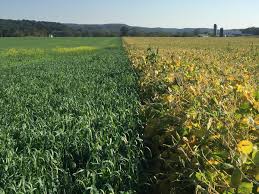Ghana prepares agriculture sector to adapt to climate change – EPA
 Ghana is taking steps to cost its agricultural sector against climate risk to enable the government to plan properly, do the necessary investment and increase resilience for the sector which is the backbone of the economy.
Ghana is taking steps to cost its agricultural sector against climate risk to enable the government to plan properly, do the necessary investment and increase resilience for the sector which is the backbone of the economy.
Dr Antwi-Boasiako Amoah, Principal Research Officer at the Environmental Protection Agency (EPA) who announced this at the recently held COP 24 in Katowice, Poland, said the costing of the sector would also enable it to adapt well and increase climate resilience.
He emphasized that increasing resilience in the agricultural sector constitutes the Paris Agreement’s Nationally Determined Contribution (NDC’s) first priority for climate change adaptation.
Therefore, Ghana had taken a participatory approach of involving affected local stakeholders from the most vulnerable agricultural regions in the North into the planning process, which also proposes concrete investment programmes to increase the resilience of agrarian communities to climate change.
Speaking at a side-event organised by GIZ and the Potsdam Institute for Climate Impact Research (PIK), in Katowice, Dr Amoah, who is also a Climate Negotiator, explained that Ghana, as one of the most vulnerable African countries, was very much being impacted by climate change, having been experiencing rising temperatures, extreme weather events, and severe droughts.
The country was also experiencing increased flooding and higher erratic rainfall patterns.
The side event was themed: “Risk-informed adaptation to climate change –the example of weather risk insurance”.
Dr Amoah mentioned that the agricultural sector in particular, was increasingly challenged by extreme and unpredictable weather events due to climate change, and therefore, it was critical that measures like insurance risk were embraced.
He said climate change was posing serious threat to food security in the country, and putting the livelihoods of the rural population, especially small holder farmers at risk, in the sector that provides more than 90 per cent of Ghana’s food needs.
According to Dr Amoah, climate change was said to reduce the yields of maize and other cereal crops by seven per cent, therefore, there was the need to address the vulnerability of Ghana’s agriculture sector and increase resilience of agrarian communities to climate change by developing and implementing coordinated adaptation polices and investment plans in line with the Agenda 2030 Sustainable Development Goals and the Paris Agreement.
He said integrating resilience paradigm into national and local planning, strategies and policies was key for driving forward adaptation action in Ghana.
He said government of Ghana had taken a number of steps to promote adaptation planning and policies on various levels: including the development of a National Climate Change Policy (2013) and National Climate Change Adaptation Strategy (2012).
Also, a National Adaptation Plan (NAP) Framework for driving forward Ghana’s NAP process was developed in October 2018; and the development and submission of its NDC in 2016 with 11 adaptation actions in seven priority sectors to be implemented in a 10- year period (2020-2030).
He acknowledged Germany’s support in providing assistance for Ghana’s NDC investment planning in the agricultural sector and capacity building on climate-smart agriculture, adding that, as a follow-up, Ghana was currently finalizing the chapter on the NDC Investment and Implementation Plan for the agricultural sector with the support of GIZ, the Germany International Development Agency.
As a next step, the Ministry of Food and Agriculture was currently carrying out regional sensitization workshops to raise awareness and to provide guidance on how to access domestic and international funding for the proposed investment programmes.
This year, all sectoral chapters of the NDC Investment Plan would be merged and Ghana’s finalized NDC Investment and Implementation Plan would be presented.
Dr Amoah said there was the need for Ghana, to take more action in increasing the enabling legal and regulatory environment for distribution of insurance, especially for agricultural insurance.
He said the growing role of micro-insurance and mobile insurance provision as well as new companies entering the market, provide a great potential for further development of climate risk insurance for the agriculture sector.
Climate risk insurance could help in various ways to alleviate some of the impacts of extreme weather events by providing rapid assistance in the form pay-outs to the people affected, he pointed out.
Source: GNA
